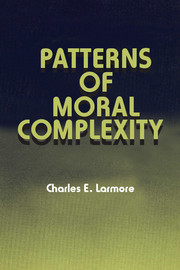Book contents
- Frontmatter
- Contents
- Preface
- Acknowledgments
- Chapter 1 MORAL JUDGMENT – AN ARISTOTELIAN INSIGHT
- Chapter 2 THE LIMITS OF NEO-ARISTOTELIANISM
- Chapter 3 LIBERALISM AND THE NEUTRALITY OF THE STATE
- Chapter 4 THE POLITICAL ORDER AND PERSONAL IDEALS
- Chapter 5 POLITICAL ROMANTICISM
- Chapter 6 THE HETEROGENEITY OF MORALITY
- CONCLUSION
- Notes
- Bibliography
- Index
Chapter 5 - POLITICAL ROMANTICISM
Published online by Cambridge University Press: 05 June 2012
- Frontmatter
- Contents
- Preface
- Acknowledgments
- Chapter 1 MORAL JUDGMENT – AN ARISTOTELIAN INSIGHT
- Chapter 2 THE LIMITS OF NEO-ARISTOTELIANISM
- Chapter 3 LIBERALISM AND THE NEUTRALITY OF THE STATE
- Chapter 4 THE POLITICAL ORDER AND PERSONAL IDEALS
- Chapter 5 POLITICAL ROMANTICISM
- Chapter 6 THE HETEROGENEITY OF MORALITY
- CONCLUSION
- Notes
- Bibliography
- Index
Summary
I have distinguished two different views of the relation between the political order and ideals of the person. The first sees the political order as predominantly a modus vivendi, a means of accommodation among individuals having divergent conceptions of the good life. On this model, neutrality can serve as the primary political ideal without playing a similar role outside the political realm in-our personal ideals. This system of diversity is opposed by the second view, which I have called expressivism. It requires that the political order express our personal ideal, in the sense that its highest ideal must mirror or coincide with what are in general our deepest commitments. Although there could be other systems of accommodation than that which is based on the neutrality of the state, the modus vivendi model has a direct and easily recognizable affinity to the liberal ideal. Liberalism, however, can also take an expressivist form if, as Kant maintained, our highest personal ideal must be autonomy. Kantian liberalism holds that the neutrality characteristic of the political realm be reflected in the distanced attitude that we should adopt throughout toward empirically conditioned conceptions of the good life.
In Chapters 3 and 4 I have argued for two propositions. First, the liberal ideal of political neutrality can be defended as a modus vivendi – without appeal, that is, to controversial ideals such as personal autonomy.
- Type
- Chapter
- Information
- Patterns of Moral Complexity , pp. 91 - 130Publisher: Cambridge University PressPrint publication year: 1987



